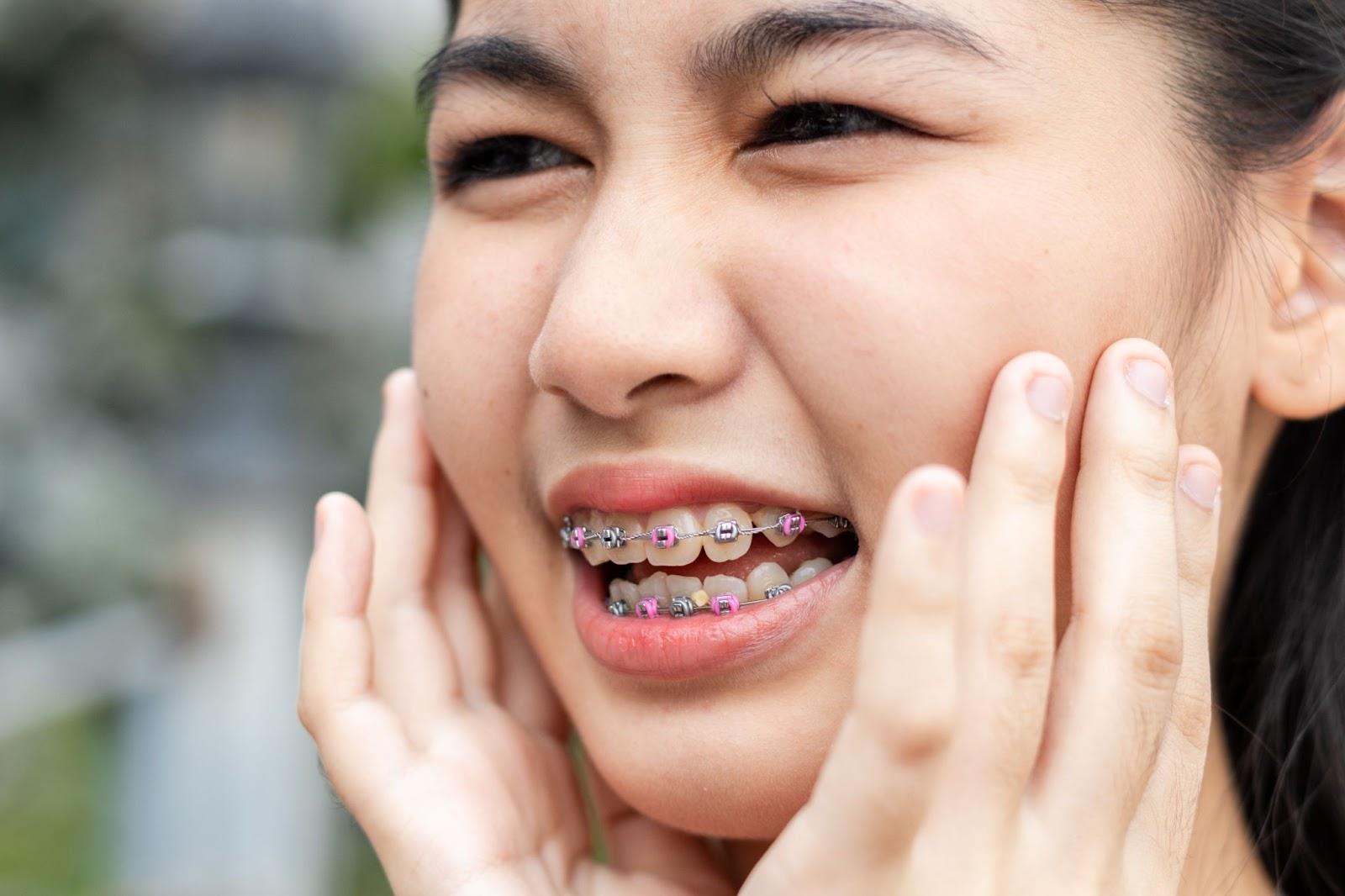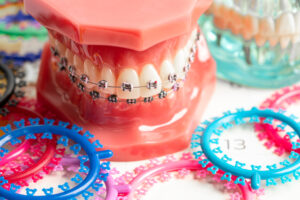At Ortho Co., we wholeheartedly understand that when it comes to your smile, there’s no compromise. As a leading Parramatta orthodontist, we’re not just about treatments; we’re about the journey you embark on towards a more confident you.
As a provider of dental braces Sydney, we’re proud to have created thousands of beautiful smiles. However, like any change, there can be an adjustment period. Many of our patients may feel some discomfort with a fresh new set of braces.
Orthodontic braces pain is normally felt in the teeth, gum, and jaw, but the good news is that this pain is temporary, and in most cases, not severe.
It is more of a bruised feeling when you are eating rather than a intense sharp pain.
Of course, it’s still a nuisance while it’s happening, so let’s talk about why braces hurt, how to get some relief, and when to come see us.
Why do braces hurt?
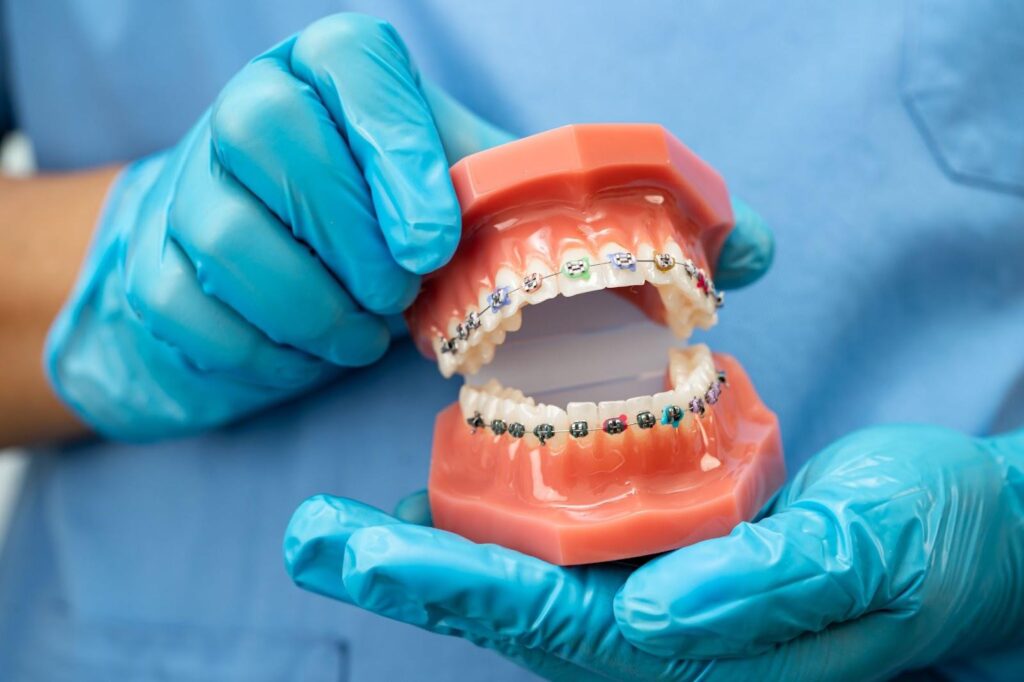
Braces work by putting pressure on your teeth so that teeth can move and straighten, so unfortunately some discomfort is inevitable. They work by either pulling or pushing your teeth in order to align them, which is going to feel strange at first.
Brackets are installed by gluing a single bracket onto each individual tooth. These brackets connect and support the arch wire. These wires might irritate the soft tissue in your mouth and around your lips. You might find yourself very aware of this new and foreign body in your mouth.
In time, however, you will get used to the feeling and it will be less noticeable. It can feel like wearing new shoes for the first time, you may get a few ulcers as the braces can rub the gums and lips as it is something new.
For braces to work, they need to be tightened every one to two months. Every time your Sydney orthodontist tightens the wires in your braces, you may feel a little additional discomfort in the teeth and gums, but the first week with new braces is usually the worst.
That being said, there are two main events in the braces process that will cause you to be uncomfortable. These are :
Pain while installing
In general, having braces installed is not painful. Like most dentistry, it may be slightly uncomfortable, but there are no needles or drills involved.
However, you might feel some pressure as the orthodontist positions tightens the wire. Your mouth may also feel a bit strange or stretched from keeping it open for an extended period.
Once everything is in place, your teeth might start feeling a little tender after a few hours as they begin adjusting to the pressure, but the actual installation process itself is more about discomfort than pain.
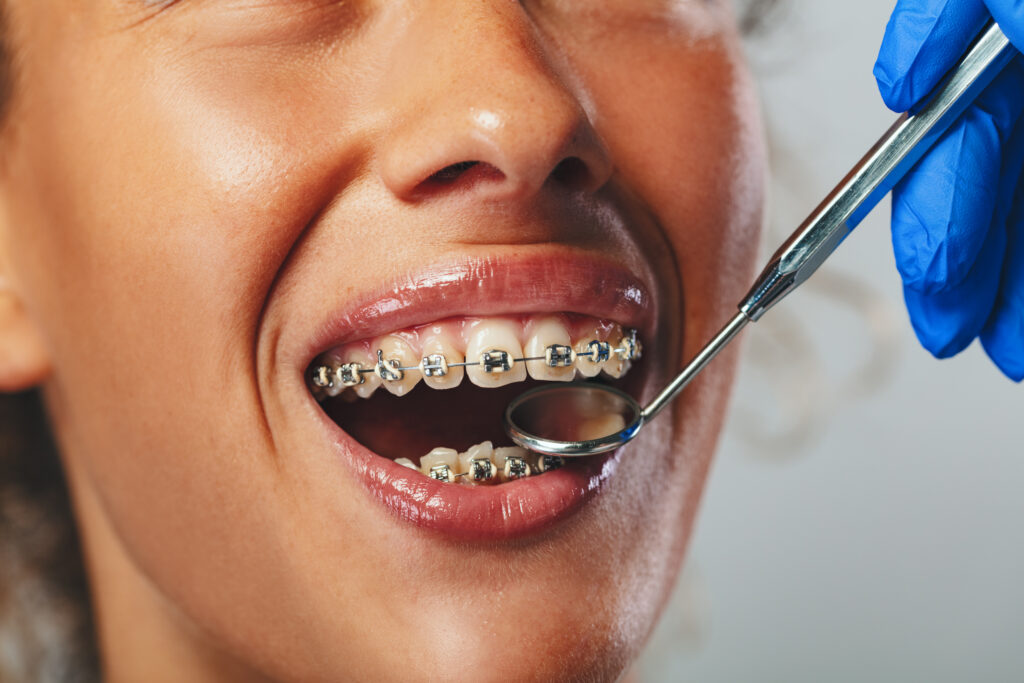
Pain while wearing
When it comes to dental braces pain, there is definitely an adjustment period. In the first week, you might experience :
- Sore gums
- Scrapes on the inside of your cheeks due to the braces rubbing
- Cuts on the tongue if you’re using your tongue to feel the braces
Your braces might feel bulky and uncomfortable in your mouth, but in time, this feeling will go away. Many patients report that after a month, they no longer notice the braces at all.
When do braces stop hurting?
Here’s a rough timeline of when you can expect dental braces pain to feel better :
| Timeframe | What to Expect | Pain Level (Low / Moderate / High) |
| Day 1 (After getting braces on) | Teeth feel tight, pressure on your jaw, and soreness begins. Lips and cheeks may feel irritated from brackets. | Moderate to High |
| Days 2-3 | Peak discomfort—teeth feel very tender and sore, especially when biting or chewing. Soft foods and pain relief may help. | High |
| Days 4-7 | Pain starts easing, but teeth may still be sensitive. Lips and cheeks adjust to the brackets. | Moderate |
| Week 2 | Significant improvement—only occasional mild discomfort when eating. Mouth starts adapting. | Low |
| After Adjustments (Every 6-8 weeks) | Fresh soreness for a few days as teeth shift again. Usually less painful than the initial braces fitting. | Moderate |
| Months 2-3 | Most pain is gone. Some tenderness after adjustments but much easier to manage. | Low |
| Throughout Treatment | Occasional discomfort, especially after tightening or if eating hard foods. | Low to Moderate |
| After Braces Are Removed | Teeth may feel slightly sensitive, but no major pain. Retainers may cause minor discomfort at first. | Low |
Tips for braces pain relief

Here are some useful remedies for braces pain:
- Use over-the-counter pain medications like paracetamol and ibuprofen to reduce discomfort and bring down swelling.
- Rub oral anaesthetic creams on your gums such as Bonjela or SM33 gel— your pharmacist can make a specific recommendation for dental braces pain relief.
- Use non-toxic orthodontic wax to form a physical barrier between the soft skin of your mouth and your braces. This can be reapplied after meals and teeth brushing.
- Eat soft foods like soup, mashed potatoes, and smoothies, while avoiding hard or sticky foods.
- Gargle with warm, salty water to treat any sores inside your mouth.
- Apply an ice pack to the outside of your cheeks and mouth.
- Slowly sip a glass of ice water— ice cream also works!
Most importantly, practice good dental hygiene by brushing gently, but regularly. Make sure you keep your new braces clean and free from trapped food.
Try to stay positive. The pain is temporary, but your beautiful new smile will last for the rest of your life.
When to see your orthodontist
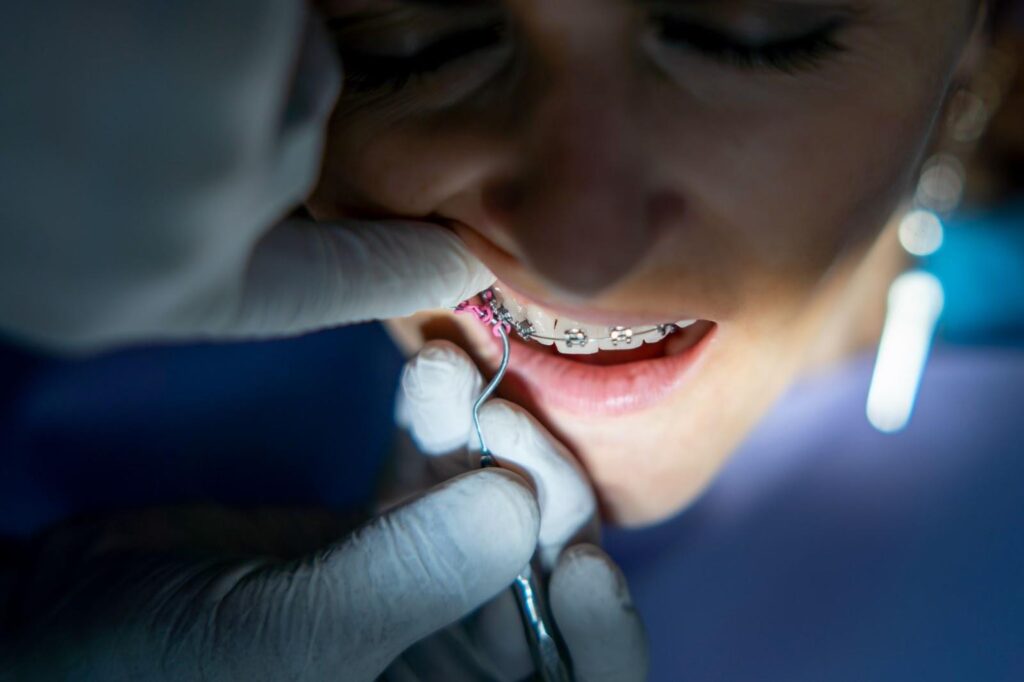
If you’ve tried all of the above pain relief for orthodontic braces and your braces are still causing you significant discomfort, then it’s probably time to see your orthodontist.
Aside from braces pain in teeth, you should also look out for worrying signs like :
- Redness and swelling around the braces area
- Difficult speaking or eating
- Changes in the colour and texture of your lips
Your orthodontist should be able to pinpoint what’s causing the issue, and make any adjustments.
Additionally, if your braces become dislodged, a wire comes loose, or the braces pops off, you should schedule an appointment with your orthodontist. In the meantime, you should place some orthodontic wax over the wire or bracket to avoid cutting your cheek.
If you’re wondering how to know if you need braces, we can help. We’re not just your orthodontist—we’re your dedicated partners in creating a smile that truly reflects your unique personality.
FAQ’s
Is it normal for one tooth to hurt with braces?
Yes, it’s totally normal for one tooth to hurt more than the others when you have braces. As your teeth shift, some might move faster or take more pressure than others, which can make one tooth feel extra sore.
It’s usually temporary and should ease up in a few days. If the pain is sharp or lasts longer than a week, it’s worth checking in with your orthodontist—just to be safe. In the meantime, pain relief, a saltwater rinse, and sticking to softer foods can help.
How to treat pain from the rubber bands in braces?
Try taking over-the-counter pain relief like ibuprofen, sticking to soft foods, and using orthodontic wax if the bands are rubbing against your cheeks.
A warm saltwater rinse can also soothe sore spots. If the pain feels unbearable or lasts more than a few days, your orthodontist might need to adjust the band placement or tension.
How much do braces hurt on a scale of 1 to 10?
Braces pain varies depending on where you are in the process.
- When you first get them, the soreness can be around a 4 to 7 out of 10 for the first few days, making biting and chewing uncomfortable.
- After a week, the pain usually drops to a mild 3 to 6 as your mouth adjusts.
- Tightenings can bring a temporary spike in discomfort, usually around a 5 to 8, but it eases within a day or two.
- If you’re wearing rubber bands, you might feel an achy sensation around a 4 to 7 at first.
- Once you’re fully adjusted, everyday discomfort is minimal, usually between 0 to 2.
Do braces change your face shape?
Yes, because they put pressure on your jaw, braces can change your face shape, although the change will be gradual.
If you have an overbite, underbite, or misalignment, braces can adjust your jaw position and the way your lips sit, which may make your profile look more balanced. In younger patients, braces can even help guide jaw growth.
Is it okay to put wax on braces while sleeping?
Yes, if brackets or wires are irritating your cheeks or lips, non-toxic orthodontic wax can help protect them overnight and prevent sore spots from getting worse.
Make sure to apply a fresh piece before bed and remove any old wax in the morning when you brush your teeth.
If the wax falls off while you’re sleeping, then don’t worry—it’s non-toxic and safe if accidentally swallowed.
Why can’t I close my mouth with braces?
Braces add extra bulk to your teeth, and if you have bite issues like an overbite or deep bite, your lips and jaw might need time to adjust.
In the early days, brackets and wires can feel in the way, making it awkward to bring your lips together. If you have bite blocks or rubber bands, they can also make closing your mouth trickier.
The good news is that your mouth will adapt over time, and as your teeth shift into place, it should become easier to close your mouth comfortably.

